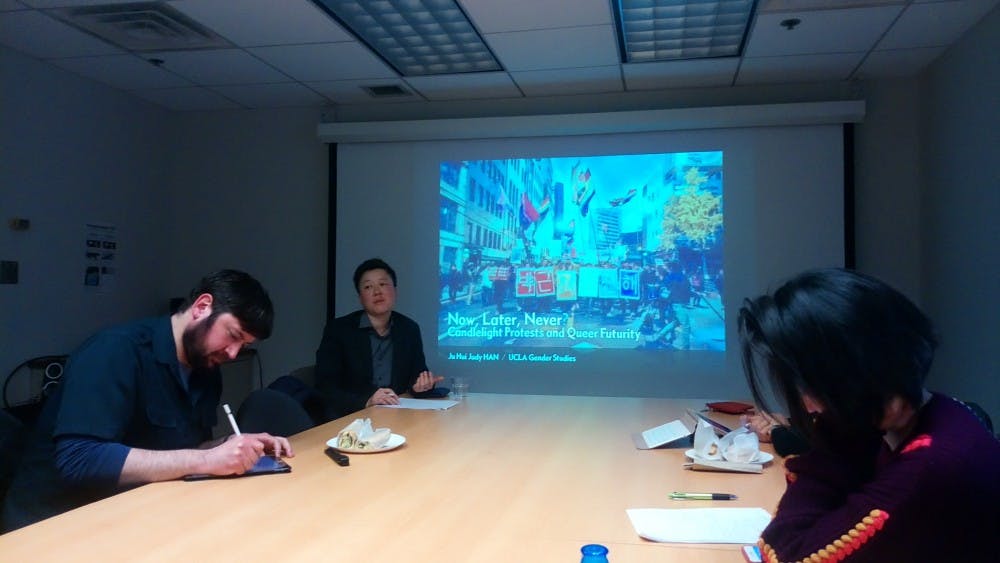Ju Hui Judy Han, an assistant professor of gender studies at the University of California, Los Angeles, gave a lecture about the intersection of candlelight protests in South Korea and queer activism on Wed. March 6. Han’s lecture, titled “Now, Later, Never: Candlelight Protests and Queer Futurity,” was the first event in a series hosted by the program in Racism and Immigration Citizenship (RIC).
Han began by discussing the use of candlelight protests to oppose former South Korean President Park Geun-hye, who had been accused of corruption. In total, 23 of these protests were held between November 2016 and Park’s impeachment in March 2017. Park would later be sentenced to 25 years in prison for 16 of the 18 charges leveled against her including bribery, extortion and abuse of power.
“The candlelight protests were part political rally and part street festival, part pedagogical and instructional and part performative and expressive,” Han said. “They drew from a heterogenous range of social and political action. Some no doubt relished the space for the nostalgia of bygone days of activism while for other this was the first protest they had ever been a part of.”
Erin Chung is a political science professor at Hopkins and one of the organizers of the speaker series. She said that she had previously attended one of Han’s lectures at George Washington University and knew that she had to invite Han to Hopkins.
“Her kind of talk is exactly the ones we really encourage,” Chung said. “[Han’s] talk resonates with the existing theories that we use that are usually based on case studies of North America and Western Europe. But she’s coming from a vantage point of Korea which makes it really, really fascinating, and I really appreciate the way it allows us to build theory using non-Western cases.”
According to Han, activist Baek Nam-gi’s death, resulting from injuries sustained from a police water cannon and the capsizing of the Sewol ferry that killed 314 passengers, helped set the stage for the candlelight protests.
Han emphasized that LGBTQ activists were also a key part of the movement.
“Queer activists are today a regular presence in South Korean political spaces though still as an underrepresented minority, and it is no longer unusual to see, for instance, a gay mens choir performing at labour rallies,” Han said. “This not to deny that political homophobia is on the rise. It is.”
Han showed an example from a Korean language textbook to demonstrate attitudes towards LGBTQ rights. The example has two people in dialogue with one another. The first person notes that there had been movements to legally recognize the rights of LGBTQ people in other countries, then a second person says that this must mean that these laws will soon be implemented in Korea. The first person then says no, given our reality that would be sigisanjo.
Sigisanjo is a Korean idiom that suggests that something is happening too early or ahead of it’s time. According to Han, the textbook suggests that legal recognition of homosexuality is not something which can happen in present-day Korea.
“By saying, like the textbook example does, that legal recognition of homosexuality and queer relations might be okay elsewhere but not here…. Sigisanjo points to an inhospitable present and gestures towards a future that is yet to come,” Han said. “While it denies present difference, difference in the present, sigisanjo seems to imply a promise, possibly a hopeful one. Maybe later. What does it mean, though, to defer the existence of being queer?”
Han then showed a video of lesbian rights activist Kwak Ekyeong confronting then presidential candidate Moon Jae-In. Jae-In tells Ekyeong that he will hear her complaints later, a chant that is then taken up by the audience.
“The scene captured on video was widely shared on social media, but the video went viral not only because of Kwak Ekyeong’s trembling, but because of Moon’s and the audience’s response,” Han said. “It’s a chilling scene of a crowd silencing the voices of one, the cheery collective chants in eerie contrast to the protesters demands to recognize the intersectionality and basic human dignity of queer lives.”
Junior Anthony Boutros stated that he enjoyed the talk. He said that Han’s research has influenced his perception of LGBTQ movements, including his own research into queer mobilization in Lebanon.
“I might need to reframe my research from being one about queer mobilization within the national and political realm, to queer mobilization within the existing progressive feminist realm,” he said. “As [Han] said that’s kind of where the main battle is of making coalitions with other groups that have arguably progressed further within traditional political spheres to be able to create a united mobilization for recognition and visibility politics.”
First year PhD student Sojung Kim also enjoyed Han’s presentation. Kim saw parallels between the deferment of LGBTQ rights through the chants of “later” is reminiscent to the sinking of the Sewol ferry which claimed the lives of many high school students who were there on a school trip.
“Many students sank in this huge ferry because the captain of the ferry said ‘wait’ to the students,” she said. “We saw the consequences of that waiting and listening to someone who is authority position.”
Kim, who attended the 2016 candlelight protests, appreciated that Han complicated the narrative behind the protests. While many credit the protests with the successful impeachment of then president Park Geun-hye, Kim emphasized that it was frustrating for LGBTQ rights activist whose hopes for legal recognition of homosexuality continues to be deferred.
“I was so frustrated in how to look at this issue – the queer issue,” she said. “The existence of this minority was erased but people were already celebrating in the moment of the impeachment of the president.”





